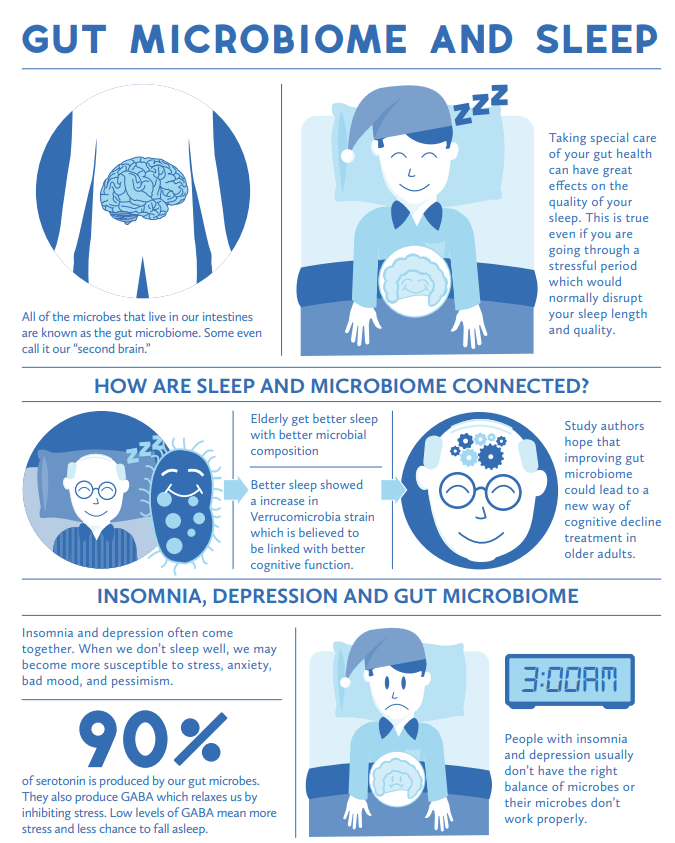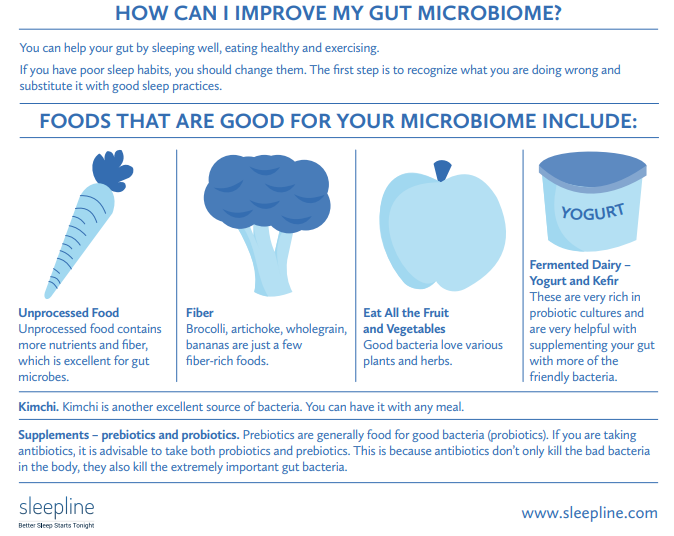Your Gut Microbiome Deserves a Good Night’s Sleep
A good night’s sleep is not only beneficial for the human host, our bacterial hitchhikers also love getting extra zzzzz’s.
Studies suggest a link between gut microbiota, sleep, and cognitive flexibility in older adults; a link between insomnia and depression; between chronic sleep disruption and insulin resistance; and a positive connection between lactobacillus casei and deep sleep.
These Sleepline infographics summarize this relationship in an easy to understand and share format.
Read Sleepline’s summary of these studies here.


View our FREE On-Demand Webinar – Getting to the Gut, Meet Your Microbiome

This one-hour complimentary journey will expand your view of how trillions of bacterial hitchhikers profoundly influence our health. We will discuss how foods, the environment and our medical practices have impacted our gut bacteria over time and strategies we can take to protect these old friends. Join us!
Gut Bacteria Resource Page & Printable Handouts
Sign up for Diabetes Blog Bytes – we post one daily Blog Byte from Monday to Friday. And of course, Tuesday is our Question of the Week. It’s Informative and FREE! Sign up below!
[yikes-mailchimp form=”1″]Retrieval Practice Can Protect Memory From Stress
Getting ready to take a test in the future? Many adults find test taking stress inducing, both in the study time leading up to it and during the exam itself.

Tufts University reported on a study on learning methods, particularly retrieval practice (learning by taking practice tests), and how this strategy can protect against the negative effects of stress.
The researchers analyzed two approaches to learning:
- one group was given multiple study periods to memorize a set of images and word (memorization)
- the other group took timed practice tests, attempting to recall as many items as they could (retrieval practice).
After a 24-hour break, half of each group was exposed to and experienced an episode of acute stress.
After this, both groups were given two memory tests to recall the words or images studied the previous day: one immediately after the stress scenario, and one twenty minutes after.
The stressed group who practiced retrieval practice remembered more items than their non-stressed counterparts who simply used multiple study periods (memorization). Those who used memorization and were exposed to a stressful scenario remembered the least out of the groups.
This study suggests that retrieval practice can help with long-term memory retention and guard against the adverse effects of stress!
Are you enrolled in our Diabetes Ed Online University?
We are proud to be using “retrieval practice” as the mode of studying for our practice tests and courses based on these scientific studies.
Our test results let students know if they chose the right our wrong answer. This approach encourages review of the material and retesting for better recall in finding the right answer. By omitting the answer key and encouraging retesting, we provide the opportunity for students to enhance long term knowledge retention and incorporate “retrieval practice” into their studies.
Read the full study here.
We hope you all appreciate and enjoy the test questions we come up with for our Question of the Week, Free Quizzes, and for all of our courses!
Interested in more practice? Our Test Taking Toolkit offers over 200 practice questions for the exam! You can purchase that here for only $49.
Sign up for Diabetes Blog Bytes – we post one daily Blog Byte from Monday to Friday. And of course, Tuesday is our Question of the Week. It’s Informative and FREE! Sign up below!
[yikes-mailchimp form=”1″]Cannabis Use Associated with Hyperglycemic Crisis in Type 1

The University of Colorado Anschutz Medical Campus shared results from the T1D Exchange Clinic Registry. The results showed that, of 932 adults with type 1 diabetes, 61 used cannabis moderately, and their risk for DKA was more than twofold greater than in nonusers. This is due to the potential that cannabis can alter glycemic control.
In a study on cannabis use, those deemed moderate use were also found more often to be male, have less education, have a younger age at diabetes diagnosis, a higher A1c, less likely to use continuous glucose monitoring, and performed less self-monitoring of blood glucose.
Those who used cannabis moderately were found to have greater risk of DKA than those who did not use cannabis. They believe this may be due to cannabis delaying gastric emptying which is thought to play a role in disruption of blood glucose control.
Read more on this study here.
Sign up for Diabetes Blog Bytes – we post one daily Blog Byte from Monday to Friday. And of course, Tuesday is our Question of the Week. It’s Informative and FREE! Sign up below!
[yikes-mailchimp form=”1″]
Lower B/P Target and Earlier Treatment for Diabetes?

People with diabetes who delay getting blood pressure to target may be more likely to have heart attacks and strokes than their counterparts who manage it promptly, a recent study suggests.
A study conducted by Dr. Sridharan Raghavan of University of Colorado Anschutz Medical Campus, examined data on over 43,000 participants. Participants were all people with diabetes who started treatment for high blood pressure between 2002 and 2007.
Those who waited until their blood pressure was more elevated before beginning treatment were 10% more likely to have events like fatal heart attacks and strokes.
Raghavan stressed that lowering blood pressure in people with diabetes with hypertension “can mitigate some of the risk of atherosclerotic cardiovascular disease.” The study indicates that people with diabetes may have improved outcomes with a lower systolic blood pressure target than the ADA target of 140 mmHg. The American Heart Associations and the American College of Cardiology’s guidelines are to start treatment when systolic blood pressure is above 130 mmHg.
Using the lower standard of 130 systolic instead of starting treatment at the higher 140 systolic standard may result in fewer deaths from heart attacks and strokes.
Read the full study here.
Sign up for Diabetes Blog Bytes – we post one daily Blog Byte from Monday to Friday. And of course, Tuesday is our Question of the Week. It’s Informative and FREE! Sign up below!
[yikes-mailchimp form=”1″]Keeping blood sugar in target may reduce risk of Alzheimer’s
In a recent panel discussion moderated by David Holtzman, Chairman of Neurology at Washington University in St. Louis, researchers discussed the association between blood sugar and Alzheimer’s. It seems that keeping blood glucose in target may reduce risk of developing Alzheimer’s.

“The risk for dementia is elevated about twofold in people who have diabetes or metabolic syndrome,” Holtzman says. “But what’s not been clear is, what’s the connection?”
To explore this link, one team experimented on two different groups of mice. In one group, they fed the mice only sugar and fat dense foods. In the other, they gave them a protein called ApoE2. ApoE2 positively affects glycolysis, which allows brain cells to turn sugar into energy. That increase in energy helps brain cells to get rid of toxins associated with Alzheimer’s.
After the treatments were put into place, the mice who were fed a high fat and sugar diet were more lethargic and developed memory loss. In contrast, the mice who were fed ApoE2 were much more energetic and their brains even seemed healthier than before.
What Holtzman and other researchers are discovering is that sugar and fat consumption and other factors such a sleep quality seem to have a real impact on the brains’ ability to function and may be associated with development of Alzheimer’s.
Read more about this article here.
Learn more about the relationship between Gut Health and Brain Health by joining our FREE Getting to the Gut – Meet Your Microbiome Webinar – Nov 12th at 11:30 am PST.
Sign up for Diabetes Blog Bytes – we post one daily Blog Byte from Monday to Friday. And of course, Tuesday is our Question of the Week. It’s Informative and FREE! Sign up below!
[yikes-mailchimp form=”1″]Free Resource Friday | Navigating Holiday Festivities
Whether it’s the candy, the turkey, stuffing, or the desserts, the holidays are a difficult time for anyone to eat healthy and avoid weight gain. Experts suggest that the holidays are not the best time to set weight loss goals. Instead, a more realistic approach is to focus on enjoying special events and weight maintenance coupled with lots of good self-care.

Weight watchers, most dietitians, and health bloggers suggest several strategies to make healthier choices when tempted by holiday fare:
- There is no need to eat to be polite – save calories or points for favorite foods. If there is lots of pressure, have 1-3 bites of whatever family or friends are suggesting.
- Be prepared for extra calories: maintain regular eating routine for the whole week leading up to the big meal. On the day of, make sure to have breakfast, and if the big meal is in the afternoon, have a small lunch or snack to avoid over-eating at the party.
- Drink calorie free beverages and choose vegetables or other low calorie options first before digging into the richer food choices.

Some interesting, alternative strategies that people are reporting success with:
- Plating up with a smaller plate: it tricks our brains into thinking we are eating more, and on average this strategy decreases intake by 40% or more.
- Wear something fitted and fabulous: boost self-confidence with an outfit that makes the wearer feel great about how they look, but also keeps them aware of quantity of food consumed.
- Take a walk after the meal instead of sinking into a recliner or couch to burn a few calories and keep metabolism revved up a bit longer.
Sign up for Diabetes Blog Bytes – we post one daily Blog Byte from Monday to Friday. And of course, Tuesday is our Question of the Week. It’s Informative and FREE! Sign up below!
[yikes-mailchimp form=”1″]Metformin May Prevent Breast & Other Cancers

Multiple studies have examined metformin for its potential tumor and cancer fighting ability. The National Center for Biotechnology Information (NCBI) published such a study in 2016. Researchers found substantial pre-clinical evidence suggesting anti-cancer properties of metformin based on in-vitro and in-vivo analysis. Their analysis suggested metformin could be used as a radiation sensitizer or immunotherapy drug, besides its direct anti-proliferative properties .
In mice with lung cancer, metformin was used and researchers saw a 72% reduction in tumor burden. Tumors are known to exhibit the Warburg effect, but metformin blunts this and consequently downregulates the growth of cancer stem cells.
Several observational studies showed a correlation between metformin use and lessened cancer incidence. The results demonstrated that metformin users have statistically significant reductions in liver, pancreatic, colorectal and breast cancers.
You can read more details on the study and enjoy their infographics and tables of data here.
Coach Beverly reports no conflict of interest for medication postings.
Sign up for Diabetes Blog Bytes – we post one daily Blog Byte from Monday to Friday. And of course, Tuesday is our Question of the Week. It’s Informative and FREE! Sign up below!
[yikes-mailchimp form=”1″]Height May Help Predict Type 2 Diabetes Risk
A recent study, analyzing more than 2,600 German adults, showed an association between height and diabetes risk. Specifically, that tall people may have lower risk for developing Type 2, while shorter people may be at increased risk for developing Type 2.

The study showed that for every 10 cm of greater height, the risk for Type 2 was 41% lower for men and 33% lower for women.
Research found that the association between height and risk for type 2 diabetes was a stronger association in people with normal weight, rather than those experiencing overweight or an elevated BMI above 30.
For men and women with normal weight, every 10 cm of greater height lessened the risk of developing Type 2 by 86% in men and 67% in women.
The study suggested that this association between height and Type 2 diabetes risk may be based on healthier cardiometabolic profiles attributable to height.
For full study details, read more on Healio.
Sign up for Diabetes Blog Bytes – we post one daily Blog Byte from Monday to Friday. And of course, Tuesday is our Question of the Week. It’s Informative and FREE! Sign up below!
[yikes-mailchimp form=”1″]







